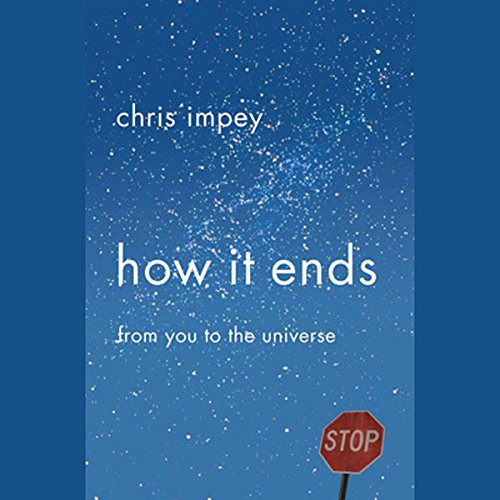
How It Ends
From You to the Universe
Failed to add items
Add to Cart failed.
Add to Wish List failed.
Remove from wishlist failed.
Adding to library failed
Follow podcast failed
Unfollow podcast failed
3 months free
Buy for $17.95
No default payment method selected.
We are sorry. We are not allowed to sell this product with the selected payment method
-
Narrated by:
-
Richard Ferrone
-
By:
-
Chris Impey
The fascinating science behind the eventual end to everything - from the individual to all existence. Although we may try to keep it tucked at the back of our minds, most of us are aware of our own mortality. But few among us know what science, with the help of insights yielded from groundbreaking new research, has to say about death on a larger scale. Enter astronomer Chris Impey, who chronicles the death of the whole shebang: individual, species, biosphere, Earth, Sun, Milky Way, and, finally, the entire universe.
With a healthy dose of humor, How It Ends illuminates everything from the technologies of human life extension and the evolutionary arms race between microbes and men to the inescapable dimming of the sun and the ultimate "big rip", giving us a rare glimpse into a universe without us.
©2010 Chris Impey (P)2010 Audible, Inc.Listeners also enjoyed...




















Critic reviews
Would you listen to How It Ends again? Why?
As a disclaimer, I must tell you how I listen to many of my Audible books. I go to sleep by them . . . as I'm drifting off, they're playing on my smartphone. Simultaneously, I also have playing (as background to the narrative) special sound effects -- a thunderstorm, along with a crackling fire. That's not to say that my Audible books are boring; I simply enjoy listening to them via ear buds all night long, while I sleep. Highly recommended. Of course, when I really want to absorb their content, I listen to them when fully awake.This one, "How It Ends: From You to the Universe," is one of my favorite books to sleep by AND to listen to when I'm fully awake. It's quite engaging; intriguing, in fact. The book talks about the end of all life (including yours), as well as the end of the non-living world/universe, in both a philosophical and scientific manner. And it does so lightly and refreshingly. You WILL understand this book.
The narrator's voice displays the perfect resonance to either 1) engage you while you're fully awake and lucid, or 2) gently rock you to sleep when you're so inclined. Honestly, both his voice and his manner of delivery are top-notch.
I could not have been more pleased with this book.
As I mentioned above, you owe it to yourself to at least try a quality "sound effects" program, and play it at the same time you are listening to Audible, especially if you have trouble sleeping. It works wonders for the quality of my sleep, and I hope it does yours, too.
What other book might you compare How It Ends to and why?
See aboveWhat about Richard Ferrone’s performance did you like?
His deep, resonant, engaging voice pulls you into the story he so capably tells.Did you have an extreme reaction to this book? Did it make you laugh or cry?
Not an extreme reaction. While there are some philosophical tidbits, the book steers clear of the usual religious explanations for the beginning and end of the universe and focuses on what science tells us is going to happen. I suppose some individuals might be disheartened by some of the content; most will not.A Bit of Science; A Bit of Philosophy
Something went wrong. Please try again in a few minutes.
E
Most of the issues you scream about, that actually need to have change of some sort. There being addressed ! The earth was first said to no longer be livable by the early 1970's I believe!! This country make a daily habit here! So we are improving every decade !! And it's being done well, and without having to listen to " The Sky Is Falling, over and over each day"
It's what comes from focusing on a problem. And not being focused on how environmental groups and some sectors of government can make profits for. Each other! And ruining hour way of life too.
Wo ye profit of Doom!!!!!!!!!
Something went wrong. Please try again in a few minutes.
TJ Granack
I love this book.
Something went wrong. Please try again in a few minutes.



